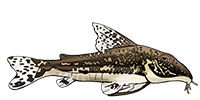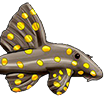| Scientific Name | Synodontis petricola Matthes, 1959 |
| Common Names | Pygmy Leopard Catfish Gøgemalle (Denmark), Kuckuck-Fiederbartwels (Germany) |
| Type Locality | Kashekezi, northern Lake Tanganyika. |
| Pronunciation | sin oh don tiss - pet ree kola |
| Etymology | According to Cuvier, Synodontis is an "ancient name for an undetermined fish from the Nile". It is not derived, as often reported, from syn-, together and odous, tooth, presumed etymology of the lizardfish genus Synodus and refers to the closely-spaced lower jaw teeth of both genera. Petricola: From the Latin petra meaning rock and cola meaning living. In other words a rock dweller. |
| Articles | |
| Size | 102mm or 4" SL. Find near, nearer or same sized spp. |
| Identification | All species in the genus Synodontis have a hardened head cap that has attached a process (humeral process) which is situated behind the gill opening and pointed towards the posterior. The dorsal fin and pectoral fins have a hardened first ray which is serrated. Caudal fin is always forked. There is one pair of maxillary barbels, sometimes having membranes and occasionally branched. The two pairs of mandibular barbels are often branched and can have nodes attached. The cone-shaped teeth in the upper jaw are short. S-shaped and movable in the lower jaw. These fish produce audible sounds when disturbed rubbing the base of the pectoral spine against the pectoral girdle. Similar to four other described catfish from the lake. The cuckoo catfish, Synodontis multipunctatus, is the most common import and you, occasionally, may also encounter S. polli, S. dhonti and S. tanganyicae. All sport the distinctive white barbels and are spotted as juveniles to some degree or other and thus another form of quick identification prevails - S. petricola and S. lucipinnis, are the only species with a solid white leading dorsal and pectoral fin ray and the spotted body pattern. S. petricola can be differentiated from S. lucipinnis by the former having smaller spots on the head than the body spots. All in all. this species (as presently defined) is highly variable and likely to contain more than one valid species in the long run. |
| Sexing | Unknown. |
| Distribution | Africa: Lake Tanganyika. African Waters, Western Rift Valley Lakes, Tanganyika (click on these areas to find other species found there) Login to view the map. |
| IUCN Red List Category | Least Concern , range map and more is available on the IUCN species page. Last assessed 2006. |
| pH | 7.0 - 8.5 |
| Temperature | 22.0-24.0°C or 71.6-75.2°F (Show species within this range) |
| Feeding | A very easy fish to feed. All prepared foods are accepted and the fish will eat heavily thus making conditioning a relatively simple task. User data. |
| Furniture | Bogwood is utilised although rock clusters appear more preferable. Seems to enjoy long, tall, flowing plants such as giant Vallisneria. |
| Compatibility | A social species tolerant of their own kind and unimposing. |
| Breeding | Because of the similarity with S. lucipinnis, it is unclear if this species is the one many aquarists have spawned. |
| Breeding Reports | There are 5 breeding reports, read them all here. |
| Reference | Folia Scientifica Africae Centralis v. 5 (no. 4), pp 78. |
| Registered Keepers | There are 180 registered keepers, view all "my cats" data. |
| Wishlists | Love this species? Click the heart to add it to your wish list. There are 12 wishes to keep this species, see who wants what. |
| Spotters | Spotted this species somewhere? Click the binoculars! There are 36 records of this fish being seen, view them all. |
| Forum BBCode | |
| Search for S. petricola | |
| Look up S. petricola on AquaticRepublic.com | |
 | Look up S. petricola on Fishbase |
 | Look up S. petricola on Encyclopedia of Life |
 | Look up S. petricola on Global Biodiversity Information Facility |
| LFS label creator ARN ref:1.13.29.857 | |
| Last Update | 2023 Jan 12 05:29 (species record created: 2002 Jun 10 00:00) |





/siluriformes/mochokidae/synodontis/petricola/1.jpg)
/siluriformes/mochokidae/synodontis/petricola/2.jpg)
/siluriformes/mochokidae/synodontis/petricola/3.jpg)
/siluriformes/mochokidae/synodontis/petricola/4.jpg)
/siluriformes/mochokidae/synodontis/petricola/5.jpg)
/siluriformes/mochokidae/synodontis/petricola/6.jpg)
/siluriformes/mochokidae/synodontis/petricola/7.jpg)
/siluriformes/mochokidae/synodontis/petricola/8.jpg)
/siluriformes/mochokidae/synodontis/petricola/9.jpg)
/siluriformes/mochokidae/synodontis/petricola/10.jpg)
/siluriformes/mochokidae/synodontis/petricola/11.jpg)
/siluriformes/mochokidae/synodontis/petricola/12.jpg)
/siluriformes/mochokidae/synodontis/petricola/13.jpg)
/siluriformes/mochokidae/synodontis/petricola/14.jpg)
/siluriformes/mochokidae/synodontis/petricola/15.jpg)
/siluriformes/mochokidae/synodontis/petricola/16.jpg)
/siluriformes/mochokidae/synodontis/petricola/17.jpg)
/siluriformes/mochokidae/synodontis/petricola/18.jpg)
/siluriformes/mochokidae/synodontis/petricola/19.jpg)
/siluriformes/mochokidae/synodontis/petricola/20.jpg)